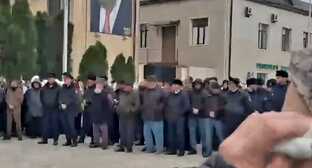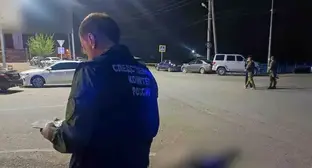22 July 2019, 12:49
Week in the Caucasus: review of main events of July 15-21, 2019
Hunger strike of Ingush activists in Nalchik SIZO; ten years after murder of Natalia Estemirova; ECtHR's decision on "Rustavi-2" Georgian TV Company; completion of nomination of candidates for the presidency of Abkhazia; escalation of the conflict on Georgian-Azerbaijani border, – read about these events in the review of the main events in the Caucasus for the week of July 15-21, 2019, prepared by the "Caucasian Knot".
Hunger strike of Ingush activists in Nalchik SIZO
On July 18, Fatima Urusova, an advocate, reported that Bagaudin Myakiev, a member of the Ingush Council of Teips (family clans), was beaten up in the Nalchik SIZO (pre-trial prison). Mustafa Taukenov, a representative of the Ombudsperson under the government of Kabardino-Balkaria, who visited the SIZO, said that on the same day, 25 detained Ingush activists kept there went on a hunger strike in solidarity with Myakiev; however, they stopped their action after meeting employees of the prosecutor's office. Myakiev was not beaten in the SIZO, but injured himself while dismantling some toilet partition in his cell, officials of the Federal Penitentiary Service (known as FSIN) stated in their turn. According to Ayes Burmamitov, a member of the local Public Oversight Commission (POC), Myakiev was twice placed into the dungeon (punishment cell) for violating the schedule and for blocking the surveillance camera. Let us note here that Myakiev and other arrested Ingush activists demand to be taken to Ingushetia and placed into a SIZO there.
Let us remind you that on March 26, 2019, residents of Ingushetia extended, without the authorities' permit, the protest action held in the square in Magas, which led to clashes with law enforcers on the following day. Since early April, a wave of arrests began in Ingushetia. According to calculations of the "Caucasian Knot", at least 96 activists were persecuted, and at least against 29 of them criminal cases were initiated.
Ten years after assassination of Natalia Estemirova
On July 15, in Moscow, human rights defenders held actions in memory of Natalia Estemirova, an employee of the Grozny office of the Human Rights Centre (HRC) "Memorial", who was abducted in Grozny and found killed in Ingushetia exactly ten years ago. Alexander Cherkasov, the Chairman of the Board of the HRC "Memorial", Svetlana Gannushkina, the Head of the Civil Assistance Committee, and Elena Milashina, a journalist of the "Novaya Gazeta", came out to Red Square with solo pickets. Mr Cherkasov held a banner reading: "Human rights defender Natalia Estemirova was killed 10 years ago"; Svetlana Gannushkina held a poster saying: "Customers and killers haven't been found yet"; and Elena Milashina held a banner with the question: "How is that, Mr President?" The picketers were detained and taken to the police station, where administrative protocols were drawn up on them for violating the rules of holding solo pickets; then, they were set free. On the same day, in Lermontov Square in Moscow, rights defenders from the Amnesty International and the HRC "Memorial" held an action in memory of Natalia Estemirova, which passed without incident. It started with lighting candles. Activists stood with posters "Who killed Natasha Estemirova?"
ECtHR's decision on the case of "Rustavi-2" Georgian TV Company
On July 18, the European Court of Human Rights (ECtHR) found legitimate the decision of the Supreme Court of Georgia, adopted in 2015, to transfer the assets of the "Rustavi-2" TV Company to its former owner Kibar Khalvashi. On the same day, Nika Gvaramiya, the director general of the TV Company was fired, and Paata Saliya, a Khalvashi's advocate, was appointed in his place. He promised not to interfere in the editorial policy of the TV Company. Opponents of the change of the "Rustavi-2" owner held an action outside the company building. They believe that residents of Georgia are at risk of losing access to objective information about the situation in the country. The authorities have made a decision to transfer the "Rustavi-2" to Kibar Khalvashi in order to influence the editorial policy of the TV Company, the Georgian experts interviewed by the "Caucasian Knot" believe. On July 19, the "Rustavi-2" team demanded to set up a public council to control the actions of the new company bosses and any personnel changes. However, Mr Khalvashi failed to support the journalists' initiative and refused to sign a promise not to influence the company's editorial policy.
End of nomination of candidates for Abkhazian presidency
On July 16, the Central Election Commission (CEC) of Abkhazia completed the reception of documents on nomination of presidential candidates. The election will be held on August 25. Documents were submitted by 10 persons, including the incumbent Raul Khadjimba. Aslan Bzhaniya, the leader of the Bloc of Oppositional Forces, who was treated by political analysts as the main Khadjimba's rival, changed his mind to put forward his candidacy and called to support Alkhas Kvitsiniya, the chairman of the "Amtsakhara" Party. The Abkhazian journalists interviewed by the "Caucasian Knot" said that the candidates have not enough support to win the election in the first round. The large number of people willing to run for the presidency indicates a political and economic crisis in Abkhazia, members of oppositional parties assert.
Conflict escalation on Georgian-Azerbaijani border
On July 15, a conflict became known in the David Gareja Monastery Complex between Georgian activists and Azerbaijani border guards. The incident occurred on July 14, when Georgian pilgrim accused border guards of desecrating monastic cells, and also expressed their dissatisfaction with the fact that border guards brought out icons from the Udabno Temple. The Azerbaijani party denied the information about the use of cells as toilets, and also stated that the icons were removed to avoid damage of them and for transfer to Georgian border guards. Because of the conflict, the Georgian ambassador was summoned to the Azerbaijani Ministry of Foreign Affairs (MFA) for explanations. After the incident, Georgia closed access to the Udabno Monastery for a week; and Azerbaijan decided to patrol only the uncoordinated section of the border. The situation is inflated by the forces seeking to undermine the strategic partnership of the two countries, the Azerbaijani political analysts interviewed by the "Caucasian Knot" have stated.
Let us remind you that the David Gareja Monastery Complex is one of the most important cultural and religious attractions of Georgia, but a part thereof is located in the territory of Azerbaijan. Conflict situations at the monastery are periodically arising because of the incomplete demarcation of the Georgian-Azerbaijani border. The parties are negotiating on this issue, but there are no concrete results yet.
This article was originally published on the Russian page of 24/7 Internet agency ‘Caucasian Knot’ on July 22, 2019 at 09:10 am MSK. To access the full text of the article, click here.





Комментирование через Кавказский узел